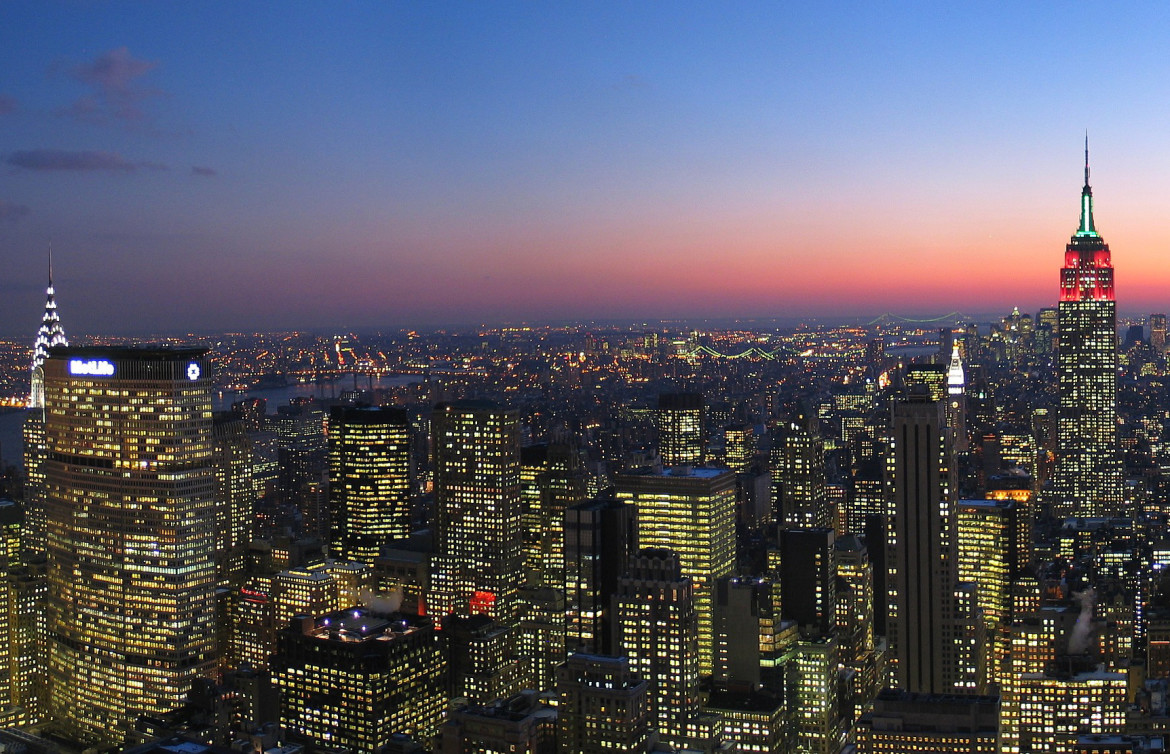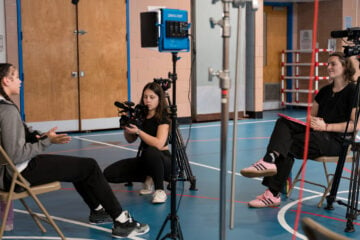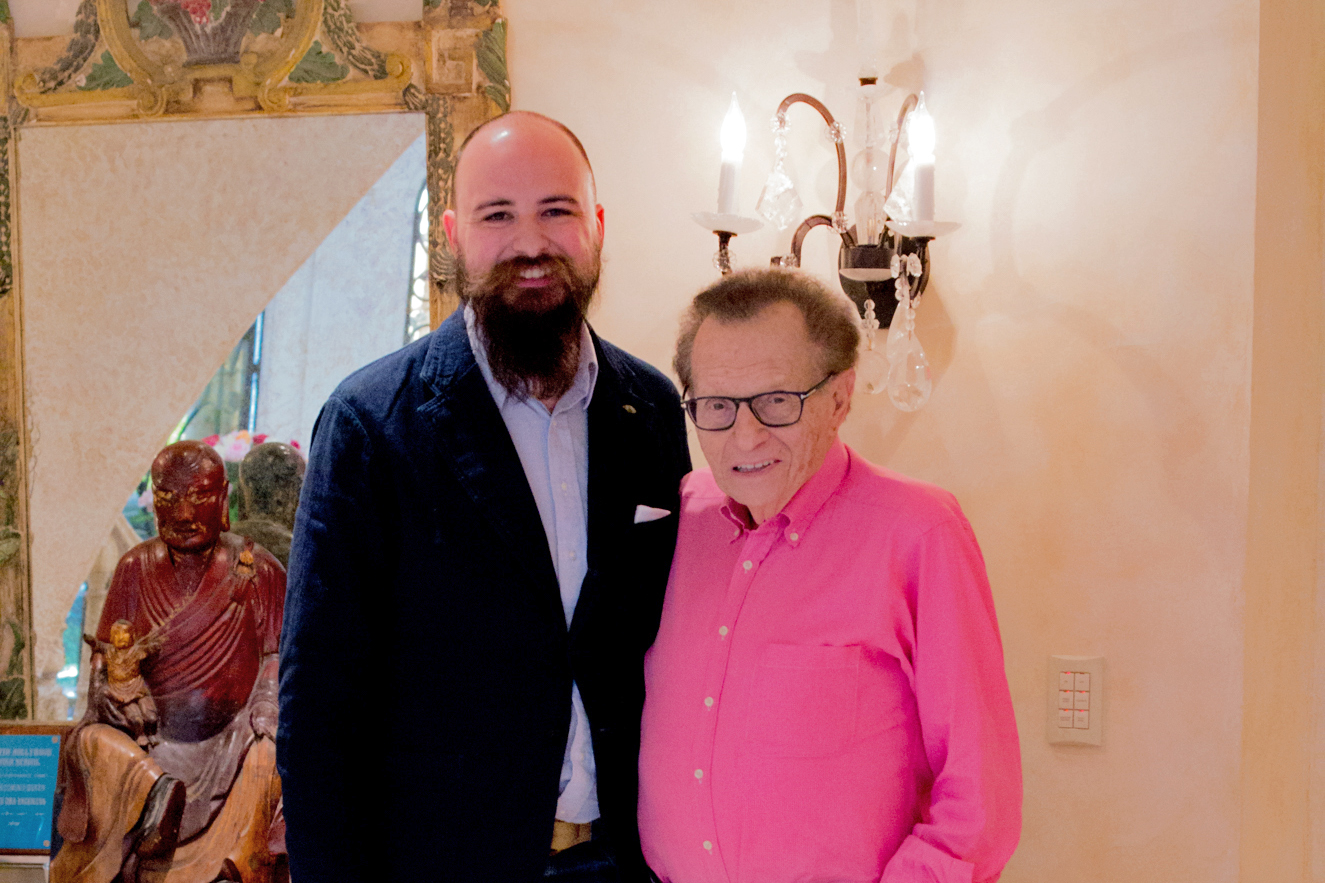Why it’s bad that New York is sucking up the podcasting industry

(Photo: Dschwen, via Wikimedia Commons)
This piece is adapted from my commentary in episode 62 of The Pub, Current’s weekly podcast.
Many of my best students, after they graduate, are hoping to work in cities like New York, Washington or Los Angeles.
Before they do, I want them to consider the case of my friend Lauren Silverman.
Silverman is 27 years old. Not long after she graduated college, she scored what a lot of people would regard as a dream job, or at least the first level of a dream job. She was a production assistant on NPR’s Weekend All Things Considered.
She worked at NPR headquarters in Washington, producing for then-WATC host Guy Raz.
NPR people don’t like to say this out loud too much, but WATC is kind of the forgotten sibling of NPR’s family of drive-time newsmagazines — it’s always the lowest rated.
But there Silverman was, living in Washington — the nation’s political power center — working as a full-time staffer on a drive-time NPR show heard by millions of people across the country.
She was 21 years old, for god’s sake! I know people twice that age who are grinding it out at local public radio stations, trying to get where Silverman was at the national level, and they’ll probably never make it.
So Silverman did that producing gig for a while, and then after three years, something funny happened: She quit and moved to Texas.
DCA → DFW
“[I] decided to trade in the beautiful cherry blossoms for prickly pears here in Texas because I wanted to be a full-time reporter,” Silverman said.
Back in Washington, she had been working in her off-hours reporting stories for Morning Edition, All Things Considered and Latino USA — on top of her full-time producing gig.
“It got to be a little bit exhausting, so I looked around for member stations with good editors where I thought I might be a good fit,” she said.
We must remember that most people who work in broadcast news share the same goal, which is going national. Most people, if they’re really honest with themselves, don’t want to work at local stations. They want to get to the network — at least when they’re young, like Silverman was (and is).
She landed a national gig straight out of the box, and after three years she voluntarily decided to go local — to go get a job at a local public radio station somewhere because she wanted to be a reporter. She wanted to be on-air. She didn’t want to book guests and write scripts for somebody else to read on the air.
Silverman ended up taking a health reporter job at KERA in Dallas. It’s a good station, but Dallas is the last place she would have ever pictured herself, she said.
“I grew up in the Bay Area — had never owned a car, shot a gun, eaten chicken-fried steak, seen an armadillo, visited a megachurch, used a drive-through bank or uttered the word ‘y’all,’” she said.
But within a year of moving to Dallas, Silverman had done all of those things. She also became one of the most bad-ass public radio reporters in the country.
She must adapt nearly every local story she does for KERA into a national pitch, because I feel like every other time I listen to All Things Considered or Marketplace or some other national show I hear a Lauren Silverman story.
She’s come a long way since the days when she was booking guests for Guy Raz, and she had to leave Washington in order to get there.
Could Silverman have been just as successful at any other local station? She doesn’t think so.
“Choosing to work at a member station in Texas meant that, number one, I had less competition,” she said. “So I could actually choose stories in a state full of untold tales and voices and accents that are rarely heard on the coasts.”
In other words, Silverman went where she was needed. She went to a place where people’s stories weren’t being told and she told them.
BOS → MAC
The story of my career is a little similar to Silverman’s, though it took me quite a few more years, because, unlike her, I have been — at times — an aimless disaster of a human. She’s way more together.
I had a really good career going in Boston, but I gave it up almost four years ago now to come to a crazypants little city called Macon, Georgia, and it was the best decision I ever made.
A lot of factors went to this decision.
My wife and I wanted to buy a home, and we went looking in our old neighborhood — Central Square in Cambridge, Massachusetts — where we saw dumpy thousand–square-foot condos selling for $600,000.
We actually made a lot of money in Boston; we maybe could have afforded the mortgage payments on a place like that, but what about the down payment? Ever since the housing crash in 2008, banks make you put 20 percent down, and there’s no getting out of it. Where the hell were we going to get $120,000 cash to put 20 percent down on a condo?
This is the house we bought in Macon for about what that down payment would have been.
Quality of life is much better for me down here, but the reason it was a good move for my career boils down to this: I was needed here. There were stories here that no one else was telling and I could tell them.
When I left Boston, I bet you some guy swooped right into my place and did my old job. There was probably a whole line of white guys with glasses who looked exactly like me just waiting to take over.
Boston didn’t need another one of me.
I’ve been much happier, more successful, and more useful in Macon.
I’m also a better person and a better journalist for living here — for being around way fewer people who are exactly like me, the way it was in Boston, and for having my Northeastern worldview challenged on a daily basis.
And yet, if my lovely university-based job in Macon ever comes to an end, I will probably have to go back to Boston, or go to New York, Washington or Los Angeles if I want to work in media at a high level.
I’ll have to sell my beautiful house and move my family to some terrible apartment where we’ll pay three or four times in rent what our mortgage costs here.
Why does it have to be this way?
Coast ← Journalism → Coast
“The game of concentration: The Internet is pushing the American news business to New York and the coasts,” read the headline of a recent article by Joshua Benton, director of the Nieman Journalism Lab.
Benton analyzed postings at JournalismJobs.com and counted how many of the jobs were based in New York or Washington. While only about 10 percent of the newspaper and television jobs were based there, nearly 40 percent of the digital media and start-up jobs were based in those two cities or their suburbs.
From this, Benton concludes that the Internet has had the exact opposite effect on the physical location of the news business than many people — including me — would have expected.
“There are some people who thought that digital distribution would mean you could be anywhere and, you know, there’s a lot of truth to that,” Benton told me. “I mean, you’re in Georgia, you’re not in a media center, and you’re able to produce your show and deliver it out to people.”
Indeed, in addition to the podcast I host, I’ve filed stories with a dozen national news outlets since moving to Macon, and I had no trouble working with any of those organizations remotely.
Ask yourself if you’ve ever texted or messaged someone who was in the next room, rather than walk five steps to talk to them in person. I’ll bet the answer is yes. If communication over the Internet is so easy that you would use it to talk to your spouse or roommate, then it’s certainly easy enough to facilitate seamless collaboration between colleagues across time zones.
And yet, most of the new digital-first news organizations — Gawker and BuzzFeed, or the podcasting start-ups where I might want to work, like Gimlet and Panoply — have headquarters in New York where most of their employees live, work and spend a ridiculous percentage of their salaries on rent.
All of these people work in New York despite the fact that, for the first time in human history, they could theoretically do their jobs from anywhere. Again, why?
Benton thinks the game of concentration is the result of media companies being “freed from the need to cover local news, which the Internet sort of does,” he said.
Localism was the obvious content strategy when media companies had to be physically dispersed in order to print and deliver newspapers or to broadcast from radio and television towers.
“In digital, it makes sense to go for scale,” Benton said. “So if you’re going for scale, it makes sense — in these folks’ minds — to be in New York near the advertisers that they’re trying to work with.”
“Basically, the digital news industry is looking a lot more like the magazine industry, which was always very concentrated in New York,” he said.
In other words, the system that brought Lauren Silverman to Dallas and me to Macon was actually an aberration from the natural order. Media companies don’t want to be anywhere other than the big media capitals.
The only reason there are media organizations in, say, middle Georgia is that the technology of radio, television and newspaper distribution was — and, to an extent, still is — geographically finite. To reach people here, you had to be here, physically.
Not true anymore with the Internet.
If my journalism undergraduates really want to make $30,000 a year writing for BuzzFeed while trying to afford rent in Brooklyn — even though there’s absolutely no good reason why they should have to live there to do that job — they should rejoice! That’s probably where they’re headed.
But if they want a different quality of life for themselves, the way things are going is not good. And more importantly, the way things are going is not good for the quality of the journalism.
If we’re only going to have journalism jobs in expensive cities, then that means only rich kids get to become journalists. The uniformity of their life experience will result in journalism that reflects a narrow, exclusive view of the world.
Also, if all the journalism jobs are in a short list of cities, then cities like Macon will only be covered remotely by people in geographically and culturally distant media capitals (if they are covered at all).
Journalists shouldn’t be clustered, and many of us don’t want to be clustered.
“My friends in California and D.C., they ask me with this sort of pity and ‘I feel so sorry for you’ voice, ‘When are you going to be able to make it back to the Bay?’” Silverman said. “They can’t believe I choose to live in the South, in Texas.”
“I tell them, with the slightest bit of braggadocio, I’m in a city that values public radio, interviewing folks who challenge my West Coast liberal education, and I’m finding my own voice,” she said.
And thank god that we still have public radio to physically position a reporter like Silverman where she is. But I am starting to fear for the geographic diversity of public radio.
Podcasting → NYC
Podcasting is still a very small slice of the American spoken audio diet, and yet it is where I feel the bulk of the creative energy has moved, and it’s where much of the future lies.
The podcasting industry, as it has grown up in recent years, is every bit as geographically concentrated as the rest of the digital news industry. If you go by iTunes chart position, the major public media players in podcasting are NPR in Washington and WNYC in New York.
Let me tell you a story that I think demonstrates both the extent of the geographic concentration and the potential dangers of that concentration. First, the characters:
Nicholas Quah is 26 years old and one of the most important people in podcasting right now. He writes a weekly newsletter called Hot Pod that is must-read industry intel for anyone working in podcasting. He lives, of course, in New York.
Anne Wootton, also quite young, is the CEO of a start-up called Pop Up Archive — a tool to make audio searchable. She lives in the San Francisco Bay area.
These are both amazing, brilliant people.
Last fall, the folks at Pop Up Archive started talking about how there needed to be some kind of forum where leaders in the podcasting industry could talk about things of mutual interest — nerdy things like standardizing podcast advertising rates and dynamic ad-insertion technology.
So Wootton recruited Quah to host a little meeting out in San Francisco. They called it “The Podcast Business and Technology Summit,” and they invited a bunch of prominent people from both the for-profit and public media podcasting worlds. Those invitees paid admission to attend (mostly to cover the meeting’s expenses, Wootton told me).
They all got together and talked, observing the Chatham House Rule, which means the proceedings were not secret per se, but everyone promised to not directly quote what somebody else said at the meeting.
Then, in April, Wootton and Quah convened another one of those summits, this time in New York City. More people, about 50, paid to attend — including representatives from NPR and WNYC — and unless you were one of the people invited, you probably haven’t heard about any of this. I only know because someone sent me a tip.
Of course, media people get together to discuss and plot the future of their industry all the time. But they generally do it at conferences, which are publicly advertised — everybody knows they’re happening, anybody can buy a ticket and sessions are on-the-record.
This is important because media is a public resource; it powerfully shapes our democracy. Public media leaders, I would argue, have a particular obligation to have their big, strategic conversations with each other out in the open.
I asked Wootton why they didn’t go the standard conference route.
“We wanted to create a safe space that, you know, wouldn’t have a lot of fanfare associated with it,” she said; a place where people could get in “meaningful proximity” instead of being arranged shoulder-to-shoulder on a panel, gazing out at an audience.
That sounds reasonable to me. Similarly, I suppose colleagues throw dinner parties at their houses to talk about work all the time, and those don’t get publicized.
But I do think these podcasting summits sound a bit more formal and a lot more important than a house party.
To be clear, I don’t think Wootton and Quah are trying to form a cabal that will decide the future of the podcasting industry behind closed doors in smoke-filled rooms.
But then again, I bet that people who do form cabals in smoke-filled rooms to decide the future of industries rarely believe that is what they are doing. They think they’re just getting together with their friends to talk. Maybe they don’t realize how powerful and important they are.
This is where the privilege of being in the club, and being in the right place — the right city — can give outsized influence to a few people in determining the formation of important things that affect all of us.
Wootton told me they didn’t make a big deal out of these first two meetings because they were experiments. She said she thinks that if these summits continue and grow, they’re probably going to need to be a little more transparent and more inclusive.
I think she’s right, and I think she and Quah are doing the industry a great service by convening these summits.
But the very fact that it’s so easy to get most of the industry leaders in podcasting together under one roof in New York serves as an indication that we have a bigger problem: The journalism will suffer if we all keep getting sucked up into this tiny list of expensive cities, and so will our bank accounts.
I tell my journalism students that they’re probably going to have to move to one of these media capitals at some point to really get their careers going.
But I implore them, once they’ve penetrated the industry, to use their power and influence to address this problem. They could tell their editor at BuzzFeed, “Hey, we do most of our talking over Slack anyway — how about I just move to Bozeman, Montana, and work from there?”
There are a lot of really nice places to live in this country. Don’t think too hard about it; just pick one. Lord knows I didn’t think too hard about Macon, and it has worked out well enough for me that I was paid to write 3,000 rambling words that you just read, and now I get to go home to my front porch.
Can’t beat that.
Adam Ragusea hosts Current’s weekly podcast The Pub and is a journalist in residence and visiting assistant professor at Mercer University’s Center for Collaborative Journalism.
Related stories from Current:











Hi Adam, did you consider the possibility that the startups are more interested in being physically close to sources of venture capital than actually reporting the news? The high cost of housing in certain cities may be in part because of all the people moving to those cities in an attempt to establish or join start-ups. I believe that because globalisation and automation are destroying white collar jobs now, the sons and daughters of the middle classes are using family capital to fund their tech dreams, instead of investing in their own communities where the capital was created. It’s so unsustainable, but it’s making a lot of money for Apple, Google and city landlords.
In an unstable business like media, having a multitude of employers around is essential. I moved to the Midwest for a job. I was laid off two years later. I couldn’t find another in the same place. Grant-funded positions are also usually transitory. In New York, a transitory job is not a crisis; you just find another. If local stations want to attract talent, they need to think about sustaining a deeper bench.
No doubt, this is one of the many reasons why most industries cluster. But I also think that if more media employers were open to telecommuting, it wouldn’t be such a crisis to get laid off in Paducah.
It cuts both ways, though. Sure there’s a lot more media jobs in NYC, but there’s orders of magnitude more people competing for them, too.
It’s a near-universal truth that if you want to work in the media biz, you have to be willing to accept that for some part of your career, you’ll be relocating quite a bit.
Thank you for Adam calling attention to this issue. It is one close to my heart as someone who turned down many an opportunity in the media centers partially out of a commitment to local news and partially in favor of a certain quality of life found in “fly over country. “
One of this things I’m hoping to do with NPR One is help it become a way for stations to share ‘local’ stories and podcasts that have appeal beyond their immediate tower footprint with people in other places where those stories might be relevant. We tend to think of content as being national or local, but there are a host of opportunities somewhere in the middle. The emergence of LJC’s, RJC’s are one way this is playing out. New platforms such as NPR One — and likely others — can provide new distribution methods for this emerging ecosystem of local.
Right on, Tamar. BTW, did you move for the new gig, or are you still in Michigan?
Not moving. Staying n Michigan!!
I’m Australian, I live in Croatia, and most of the podcasts I listen to are from the UK. Giving an outsize influence to US-based podcasts is also doing a disservice, I think! So many great podcasts are about universal themes – literature, comedy, music, science – which means they can be told from anywhere in the world. That’s what makes them awesome.
I agree with a hell of a lot about this commentary. I decided in 1992 to stay in a small town (Key West) rather than moving to a higher-profile position at my newspaper, or try to move to NYC, DC or Boston. I think working for a smaller station offers huge opportunity for young journalists, especially if that station has smart editors who can teach you a lot, like mine does (WLRN in Miami). BUT … I think you’re missing something if you still gauge the significance of Lauren Silverman’s work by how often it appears on NPR or nationally distributed shows. I hope she derives satisfaction for her stories that only run in Dallas, or in Texas, because that’s where they really matter. And OF COURSE all the highest profile podcasts are out of media centers like NYC and LA – but I think the value of a podcast should be measured in ways other than iTunes ranking. If someone creates a podcast that covers and serves her community, it may never show up high on iTunes. And she may never get invited to the secret meetings about how the podcasting industry is shaped. But I’d argue it still has huge value to that community and, potentially, to the local station. It is a challenge to figure out how to support that – but what else is new?
So basically – I’d say, yes, seek the hinterlands, young journalists. But don’t view that as merely a rung on the ladder. Like you in Macon and me in Key West, they may find that moving to a place far from their roots can be a truly great experience. Don’t aim to work for Buzzfeed in Paducah. Aim to work with local outlets – and make them better. Or, if you’re the entrepreneurial sort, start your own.
Much I agree with here; things I believe but just couldn’t fit into this particular narrative. I hope that I’m as big a booster of localism as anyone. However, one question: Don’t you think Buzzfeed would be better if it had someone on staff writing from Paducah?
Absolutely. You’d think Buzzfeed would realize how much they could gain, in diversity of perspective and by hiring people who weren’t stressed out from spending 80 percent of their salary living in a closet in Queens or wherever young media people live in NYC these days. But it’s probably impossible to see that from the center of the media universe.
This is – rightly – a highly similar phenomena to why it’s important that NPR produce more content out of NPR West in Los Angeles. There is a very, very real perspective that is unique to each metro area, and the residents/employees of those areas cannot help but allow that perspective to affect their content. Bostonians are not New Yorkers are not DC Beltway Denizens are not Los Angelinos are not Chicagoans are not Twin Cities folks are sure as hell not Texans.
It’s MOST noticeable with “Beltway Perspective” vs, well, pretty much anywhere else. But it’s still just as true that if all the podcasts are produced in New York, you’re intentionally not getting valuable perspective from other regions, socioeconomic situations, ethnicities, etc etc etc.
Diversifying regionally can help a great deal with this…that’s why I’m glad we’re seeing more ME & ATC hosting out of NPR West. I think this should be expanded as much as possible.
As a native Manhattanite, I intimately understand the impulse to feel that NYC and the Northeast corridor is the center of the (pick a) universe. But that is due largely to it being the center of the advertising universe. While commerce may be strongest there, I would argue that creative podcasting hubs exist in many other hotspots, not the least of which is the SF Bay Area. Consider the players: 99%PI, Fugitive Waves, Reveal, Snap Judgement, Life of the Law, The World According to Sound, Stitcher, not to mention Youth Radio, Detour, Pop-Up Archives, and the vibrant pubradio stations.
As the graduating class of 2016 leaves the Graduate School of Journalism at UCBerkeley to move into the workplace, I see that the vast majority of talented, creative, hard-working young journalists are choosing to remain on this side of the continent to perpetuate the “West Coast Sound.”